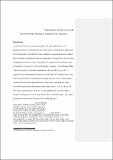Files in this item
Over Her Live Body? Marriage in Valerius Flaccus’ Argonautica
Item metadata
| dc.contributor.author | Buckley, Emma | |
| dc.contributor.editor | Manioti, Nikoletta | |
| dc.date.accessioned | 2018-07-31T23:31:53Z | |
| dc.date.available | 2018-07-31T23:31:53Z | |
| dc.date.issued | 2016-08-01 | |
| dc.identifier | 243045254 | |
| dc.identifier | 63ecd6fc-394d-4375-b751-e4c32b82b1ed | |
| dc.identifier.citation | Buckley , E 2016 , Over Her Live Body? Marriage in Valerius Flaccus’ Argonautica . in N Manioti (ed.) , Family in Flavian Epic . Mnemosyne, Supplements , vol. 394 , Brill , pp. 61-88 . https://doi.org/10.1163/9789004324664_005 | en |
| dc.identifier.isbn | 9789004324527 | |
| dc.identifier.isbn | 9789004324664 | |
| dc.identifier.issn | 0169-8958 | |
| dc.identifier.other | ORCID: /0000-0002-7937-9134/work/60195519 | |
| dc.identifier.uri | https://hdl.handle.net/10023/15737 | |
| dc.description.abstract | This chapter examines the wedding of Jason and Medea in Valerius Flaccus’ Argonautica, arguing that the marriage ceremony held in book 8 is a charged moment for Roman epic itself, serving as a microcosm for a much deeper reflection on the role of marriage in constituting Roman epic. It starts by framing Valerius’ marriage within the epic tradition, within which, I argue, Valerius’ wedding exaggerates the power of the disruptive female, drawing together the troubling hints of Medea’s tragic identity from her introduction in the epic. But Valerius also uses Argonautica’s status as ‘first’ epic to provide an origin story for the role of coniugium which valorizes her epic role. It is Medea’s deeds which constitute labor (V. Fl. 5.453), not Jason’s, her flight rather than his quest memorialized in song. Re-purposing Virgil’s flirtation with and avoidance of coniugium—a ‘marriage’ to Dido that is a dead end for the narrative but is of crucial importance for the rise of Rome itself via its conflict with Carthage—the ‘Roman’ Medea who confronts Jason at the end of the Argonautica, fighting for her rights as a Roman wife, is a truly appropriate symbol for a tradition of epos. The result—not just a deeply disturbing wedding ceremony in Argonautica 8, but also an epic that attributes empire and epos to the survival of the disruptive female—offers its Flavian readers a revisionary origin-story for epic itself. | |
| dc.format.extent | 789411 | |
| dc.language.iso | eng | |
| dc.publisher | Brill | |
| dc.relation.ispartof | Family in Flavian Epic | en |
| dc.relation.ispartofseries | Mnemosyne, Supplements | en |
| dc.title | Over Her Live Body? Marriage in Valerius Flaccus’ Argonautica | en |
| dc.type | Book item | en |
| dc.contributor.institution | University of St Andrews. School of Classics | en |
| dc.contributor.institution | University of St Andrews. Centre for the Literatures of the Roman Empire | en |
| dc.contributor.institution | University of St Andrews. St Andrews Institute of Medieval Studies | en |
| dc.identifier.doi | https://doi.org/10.1163/9789004324664_005 | |
| dc.description.status | Peer reviewed | en |
| dc.date.embargoedUntil | 2018-08-01 | |
| dc.identifier.url | https://doi.org/10.1163/9789004324664 | en |
This item appears in the following Collection(s)
Items in the St Andrews Research Repository are protected by copyright, with all rights reserved, unless otherwise indicated.

